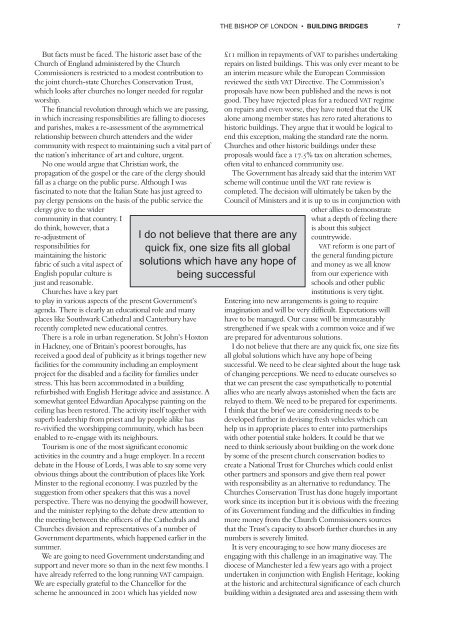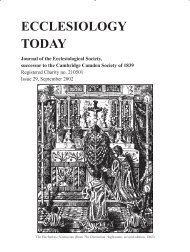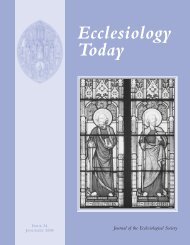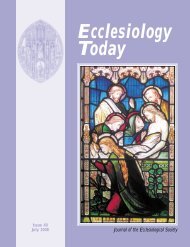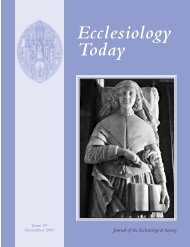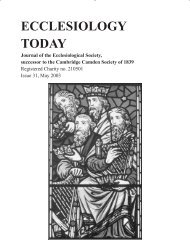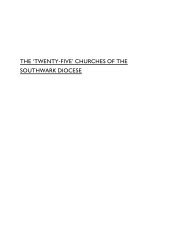PARISH CHURCHES? how do we keep our - Ecclesiological Society
PARISH CHURCHES? how do we keep our - Ecclesiological Society
PARISH CHURCHES? how do we keep our - Ecclesiological Society
Create successful ePaper yourself
Turn your PDF publications into a flip-book with our unique Google optimized e-Paper software.
THE BISHOP OF LONDON • BUILDING BRIDGES 7<br />
But facts must be faced. The historic asset base of the<br />
Church of England administered by the Church<br />
Commissioners is restricted to a modest contribution to<br />
the joint church-state Churches Conservation Trust,<br />
which looks after churches no longer needed for regular<br />
worship.<br />
The #nancial revolution through which <strong>we</strong> are passing,<br />
in which increasing responsibilities are falling to dioceses<br />
and parishes, makes a re-assessment of the asymmetrical<br />
relationship bet<strong>we</strong>en church attenders and the wider<br />
community with respect to maintaining such a vital part of<br />
the nation’s inheritance of art and culture, urgent.<br />
No one would argue that Christian work, the<br />
propagation of the gospel or the care of the clergy should<br />
fall as a charge on the public purse. Although I was<br />
fascinated to note that the Italian State has just agreed to<br />
pay clergy pensions on the basis of the public service the<br />
clergy give to the wider<br />
community in that country. I<br />
<strong>do</strong> think, <strong>how</strong>ever, that a<br />
re-adjustment of<br />
responsibilities for<br />
maintaining the historic<br />
fabric of such a vital aspect of<br />
English popular culture is<br />
just and reasonable.<br />
Churches have a key part<br />
to play in various aspects of the present Government’s<br />
agenda. There is clearly an educational role and many<br />
places like Southwark Cathedral and Canterbury have<br />
recently completed new educational centres.<br />
There is a role in urban regeneration. St John’s Hoxton<br />
in Hackney, one of Britain’s poorest boroughs, has<br />
received a good deal of publicity as it brings together new<br />
facilities for the community including an employment<br />
project for the disabled and a facility for families under<br />
stress. This has been accommodated in a building<br />
refurbished with English Heritage advice and assistance. A<br />
somewhat genteel Edwardian Apocalypse painting on the<br />
ceiling has been restored. The activity itself together with<br />
superb leadership from priest and lay people alike has<br />
re-vivi#ed the worshipping community, which has been<br />
enabled to re-engage with its neighb<strong>our</strong>s.<br />
T<strong>our</strong>ism is one of the most signi#cant economic<br />
activities in the country and a huge employer. In a recent<br />
debate in the House of Lords, I was able to say some very<br />
obvious things about the contribution of places like York<br />
Minster to the regional economy. I was puzzled by the<br />
suggestion from other speakers that this was a novel<br />
perspective. There was no denying the goodwill <strong>how</strong>ever,<br />
and the minister replying to the debate drew attention to<br />
the meeting bet<strong>we</strong>en the of#cers of the Cathedrals and<br />
Churches division and representatives of a number of<br />
Government departments, which happened earlier in the<br />
summer.<br />
We are going to need Government understanding and<br />
support and never more so than in the next few months. I<br />
have already referred to the long running VAT campaign.<br />
We are especially grateful to the Chancellor for the<br />
scheme he announced in 2001 which has yielded now<br />
I <strong>do</strong> not believe that there are any<br />
quick fix, one size fits all global<br />
solutions which have any hope of<br />
being successful<br />
£11 million in repayments of VAT to parishes undertaking<br />
repairs on listed buildings. This was only ever meant to be<br />
an interim measure while the European Commission<br />
revie<strong>we</strong>d the sixth VAT Directive. The Commission’s<br />
proposals have now been published and the news is not<br />
good. They have rejected pleas for a reduced VAT regime<br />
on repairs and even worse, they have noted that the UK<br />
alone among member states has zero rated alterations to<br />
historic buildings. They argue that it would be logical to<br />
end this exception, making the standard rate the norm.<br />
Churches and other historic buildings under these<br />
proposals would face a 17.5% tax on alteration schemes,<br />
often vital to enhanced community use.<br />
The Government has already said that the interim VAT<br />
scheme will continue until the VAT rate review is<br />
completed. The decision will ultimately be taken by the<br />
Council of Ministers and it is up to us in conjunction with<br />
other allies to demonstrate<br />
what a depth of feeling there<br />
is about this subject<br />
countrywide.<br />
VAT reform is one part of<br />
the general funding picture<br />
and money as <strong>we</strong> all know<br />
from <strong>our</strong> experience with<br />
schools and other public<br />
institutions is very tight.<br />
Entering into new arrangements is going to require<br />
imagination and will be very dif#cult. Expectations will<br />
have to be managed. Our cause will be immeasurably<br />
strengthened if <strong>we</strong> speak with a common voice and if <strong>we</strong><br />
are prepared for adventurous solutions.<br />
I <strong>do</strong> not believe that there are any quick #x, one size #ts<br />
all global solutions which have any hope of being<br />
successful. We need to be clear sighted about the huge task<br />
of changing perceptions. We need to educate <strong>our</strong>selves so<br />
that <strong>we</strong> can present the case sympathetically to potential<br />
allies who are nearly always astonished when the facts are<br />
relayed to them. We need to be prepared for experiments.<br />
I think that the brief <strong>we</strong> are considering needs to be<br />
developed further in devising fresh vehicles which can<br />
help us in appropriate places to enter into partnerships<br />
with other potential stake holders. It could be that <strong>we</strong><br />
need to think seriously about building on the work <strong>do</strong>ne<br />
by some of the present church conservation bodies to<br />
create a National Trust for Churches which could enlist<br />
other partners and sponsors and give them real po<strong>we</strong>r<br />
with responsibility as an alternative to redundancy. The<br />
Churches Conservation Trust has <strong>do</strong>ne hugely important<br />
work since its inception but it is obvious with the freezing<br />
of its Government funding and the dif#culties in #nding<br />
more money from the Church Commissioners s<strong>our</strong>ces<br />
that the Trust’s capacity to absorb further churches in any<br />
numbers is severely limited.<br />
It is very enc<strong>our</strong>aging to see <strong>how</strong> many dioceses are<br />
engaging with this challenge in an imaginative way. The<br />
diocese of Manchester led a few years ago with a project<br />
undertaken in conjunction with English Heritage, looking<br />
at the historic and architectural signi#cance of each church<br />
building within a designated area and assessing them with


